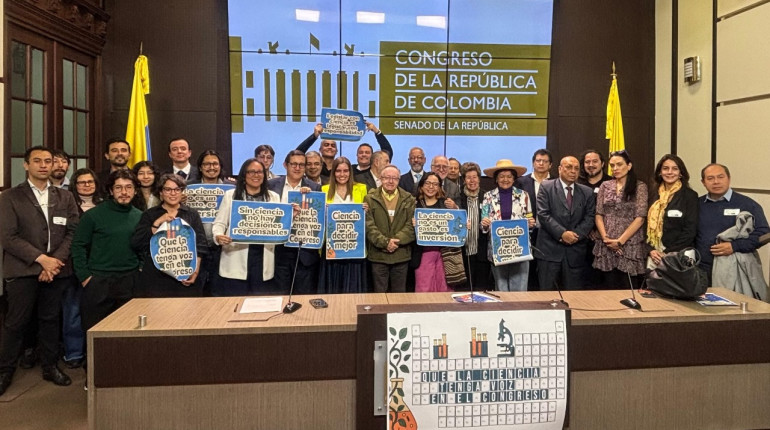In July 2025, I participated in the Meeting on Legislative Foresight and Anticipatory Governance (Encuentro sobre Prospectiva Legislativa y Gobernanza Anticipatoria) held at the United Nations House in Bogotá, Colombia, as a member of the Global Young Academy and representing the Young Academy of Colombia.
The meeting was organized by the United Nations Economic Commission for Latin America and the Caribbean (ECLAC) and AvanCiencia, and brought together key actors from the legislative branch, academia, civil society, private sector, and international organizations. The aim was to initiate dialogue around the creation of an interparliamentary space to promote strategic foresight and anticipatory policymaking in Colombia.
During the meeting, I offered insights on the role of science and youth in shaping long-term governance strategies, and highlighted the essential contributions of early- and mid-career researchers (EMCRs) to national dialogues on innovation, sustainability, and democratic resilience. In particular, I emphasized how anticipatory governance – an approach that seeks to identify emerging trends, risks, and opportunities in advance – and legislative foresight – the practice of integrating long-term analysis into lawmaking processes – can help strengthen the capacity of parliaments to address complex and rapidly evolving challenges.
I emphasized that by incorporating scientific evidence, youth perspectives, and including the scientific diaspora, Colombia can build more adaptive policies that anticipate disruptive technologies, climate risks, demographic shifts, and social transformations before they fully unfold. These tools are especially relevant in ensuring that legislation is not only reactive but also proactive, inclusive, and future-oriented.
This event aligned with broader efforts led by ECLAC to strengthen legislative foresight capacity in Latin America and the Caribbean, as outlined in their recent publication, Gobernanza anticipatoria y prospectiva legislativa: un imperativo para América Latina y el Caribe (2025).
Read more about the CEPAL Initiative here.
Colombian Scientists Propose Creation of Legal Commission for Science in Congress
Also in July 2025, a coalition of scientists and science advocates in Colombia made a historic move by submitting a bill to the Colombian Congress that seeks to create a Legal Commission for Science, Technology and Innovation. This proposed commission would serve as a formal legislative body dedicated to strengthening science policy and ensuring that science and evidence play a central role in national decision-making processes.
The initiative, supported by members of the Colombian scientific community and various academic organizations, aims to institutionalize the voice of science within the legislative branch, enhancing dialogue between policymakers and researchers.
I was honored to attend the filing of the bill, an initiative led by Representatives Jennifer Pedraza, Alexandra Vásquez, Leyla Rincón, and Senator Guido Echeverri, with whom I had been collaborating since early 2025 by contributing to the bill’s refinement. The proposal seeks to establish an interparliamentary commission composed of 10 members of the House of Representatives and 9 Senators. Preference will be given to legislators with experience in science, technology, innovation, higher education, or technological entrepreneurship, or to those who, due to their interests, wish to participate and who express their commitment to science. In addition, participation will be open to national and international scientific associations and organizations.
My involvement reflects the growing participation of EMCRs in science diplomacy and public policy in Colombia, and highlights the importance of including diverse scientific voices in legislative processes.
This initiative aligns with global efforts to embed science more deeply into public governance and to build robust science advice mechanisms within parliaments— thereby helping provide informed policy-making that can address complex societal challenges.
